ELECTRIC VEHICLE CHARGING points are becoming a standard amenity at hotels, akin to the rise of Wi-Fi in the early 2000s. Benefits for the hotel owners and franchisers can include additional revenue, carbon credits as well as attracting guests from the growing number of electric vehicle drivers.
A 2022 Green Lodging survey by the American Hotel and Lodging Association revealed a surge in the deployment of EV chargers within the hospitality sector, with 26.6 percent of all U.S. hotels equipped with charging stations. The EV charging facilities are more commonly found at luxury hotels (nearly 90 percent offer them), while only about one in five limited-service hotels provides charging, representing significant growth opportunities.
Hotel brands such as Hilton Hotels & Resorts, Marriott International, BWH Hotel Group, IHG Hotels & Resorts, Choice Hotels International, Hyatt Hotel Corp. and G6 Hospitality have prioritized deploying EV charging based on customer preferences. Their franchisees have begun incorporating EV charging infrastructures into their properties.
"We've heard from our owners that offering EV charging solutions is increasingly influential for guests when choosing hotels," said Brian McGuiness, IHG’s senior vice president of global guest experience. "This is backed by our observation of guests using EVC filters on the IHG One Rewards mobile app and website. Our integrated EV-charger search filter within the IHG One Rewards mobile app allows travelers to easily find properties with EV charging capabilities, empowering them to plan their journeys conveniently and confidently."
Offering EV charging facilities can be a way for hotels to attract guests and achieve higher RevPAR rates, highlighting the direct link between charging availability and increased profitability. Multiple EV charging providers launched nationwide hotel deployments in 2023, with brands including Marriott, Hilton, BWH and IHG partnering with preferred suppliers.
“By providing EV charging stations as an amenity for guests, hotels are able to attract guests to their hotels who otherwise may not have stayed at their location if an EV charger wasn’t available,” said Michael Morton, BWH Hotels’ vice president of brand management and member services. "As EV charging stations become increasingly important to travelers, BWH Hotels is dedicated not only to offering a convenient amenity but also to considering the environmental impact they bring.”
IHG and BWH embrace EV Surge
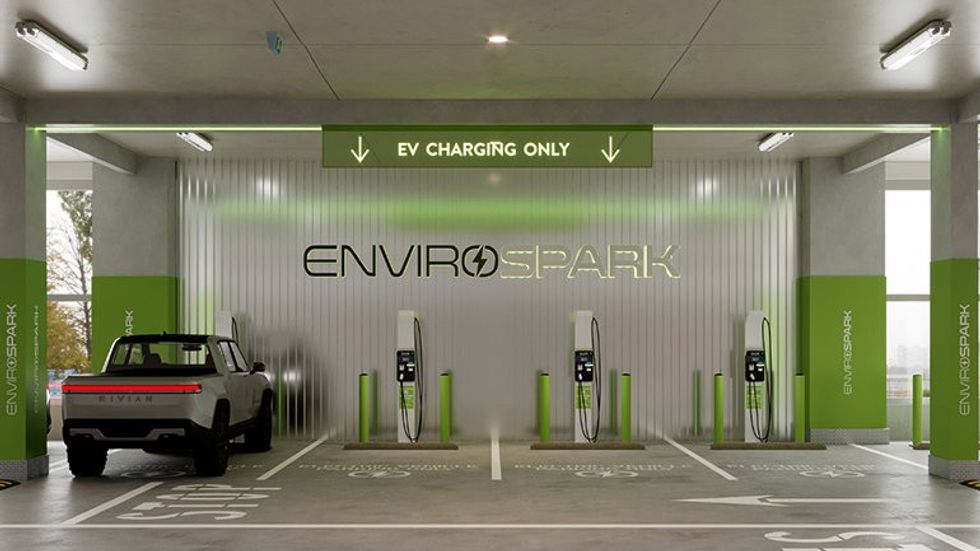
IHG is pursuing the adoption of EV charging solutions for hotels across the U.S. and Canada in partnership with EnviroSpark. Similarly, EV charging stations have become standard for new properties joining BWH since 2017. Through its recent collaboration with Tesla, BWH has seen a surge in existing hotels seeking installations.
“With various operating models available from EnviroSpark, IHG hotels can tailor EV charging solutions to their specific needs,” said McGuiness of IHG. “Additionally, IHG is providing hotel owners with an EV charging playbook containing best practices and preferred vendors to streamline the installation process. We continue to assess the market to identify the right vendors and solutions to meet evolving needs.”
IHG has an existing agreement with Tesla for electric vehicle chargers at select IHG-branded hotels in the U.S. and Canada. This partnership, featuring the new Tesla Universal Wall Connectors, began in January. These EVCs are compatible with any North American EV model. As the industry evolves, IHG will adapt to varying needs across hotels and markets.
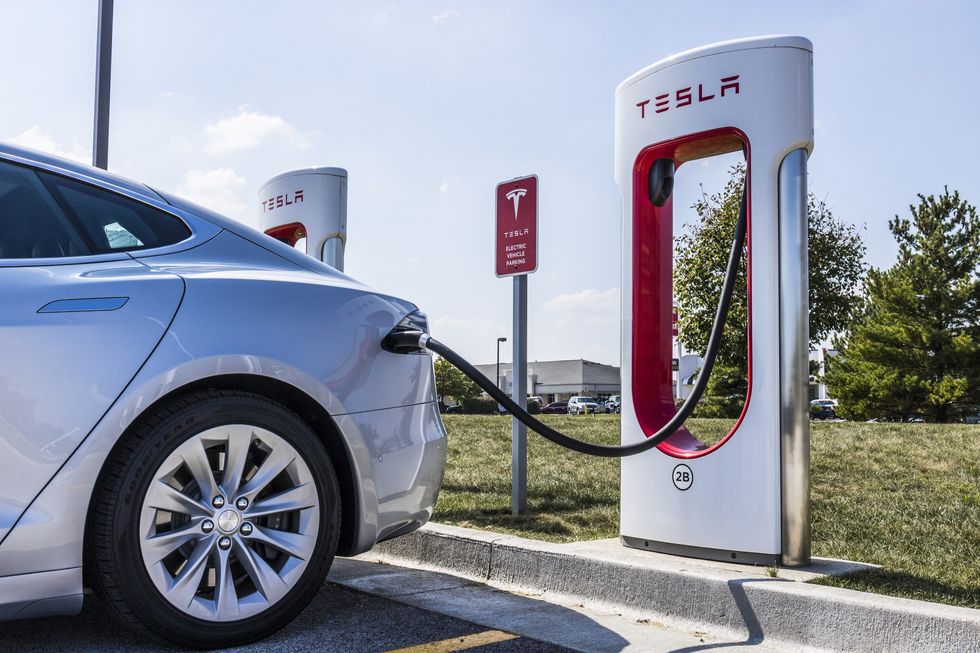
In December, BWH Hotels announced a partnership with Tesla to install Universal Wall Connections at select hotels across North America. With the recent launch of Tesla’s Universal Wall Connector, the charging stations will be compatible with all EVs, making them more accessible to everyone with EVs.
“As a result of Tesla’s partnership with BWH Hotels and Dominion Energy, our properties located in South Carolina – specifically those within Dominion Energy service areas – have an exclusive opportunity for a turnkey installation of new Tesla Universal EV Chargers,” said Morton of BWH. “This program offers Universal EV Chargers with zero upfront cost, reimbursed gradually through on-bill payback. The properties keep all the revenue from paid charging sessions.”
Hilton, Marriott, and Choice Hotels are also among the major players embracing the EV surge by expanding EV charging access at their properties. Hilton plans to install up to 20,000 Level 2 Tesla Universal Wall Connectors at its U.S. hotels, while Marriott is partnering with EV Connect to introduce new EV chargers at 6,000 hotels across the U.S. and Canada. Choice Hotels aims to have EV chargers at 15 percent of its global hotels by 2025, in collaboration with Tesla and EOS Linx.
“Hoteliers are recognizing that EV chargers can have a positive impact on their sustainability and overall guest appeal,” said Tony Booth, Stay-N-Charge’s founder and CEO. “EV charging supports sustainable transportation and is eligible for carbon credits in some markets. We recommend that any hotel owner building or undergoing renovation invest in the necessary infrastructure for now and the future. Futureproofing allows hotels to avoid adding more conduits when demand increases.”
Georgia-based Stay-N-Charge's clients include U.S. hotels such as KSL Capital Partners and Buffalo Lodging Associates, among others, which operate numerous hotels across the U.S.
Sustainable and economical
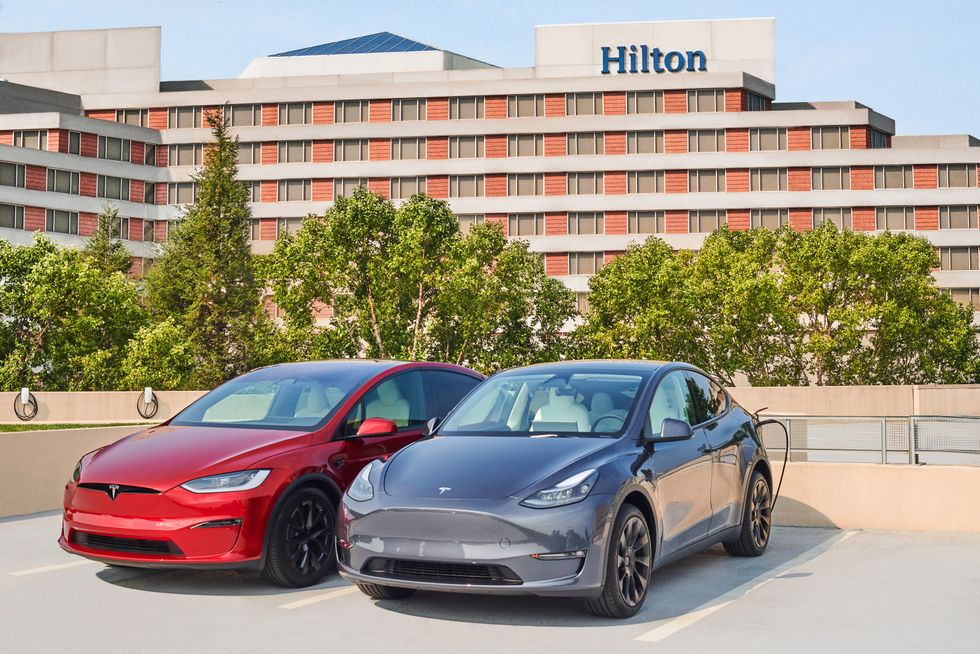
Several hotel brands say they consider the installation of EV charging units as part of their sustainability efforts as it attracts a growing number of eco-conscious guests. Similarly, hotels are attracted by the decreasing cost of electric vehicles that is mirrored by the affordability of the infrastructure needed to support them. Additionally, several U.S. states offer tax incentives for installing charging stations, while automakers provide programs offering free or low-cost charging station installations for hotels.
“Through our company's global sustainability initiative, 'Because We Care,' focusing on Earth, people, and community efforts, BWH Hotels aims to empower communities by equipping hoteliers with tools for meaningful change,” said Morton. “We are committed to supporting hotels in their efforts to protect the environment, reduce their carbon footprint, and conserve energy and water.”
However, sustainability is not the only criterion.
“The primary determinant affecting hotels is the demand from EV drivers,” said Booth with Stay-N-Charge. “The presence of EV chargers outweighs any other amenity in influencing EV drivers' decisions. In fact, some EV drivers state that they would switch brands solely based on EV charging availability.”
For instance, Tesla's Destination Charging program collaborates with hotels to install charging hardware, providing free or discounted wall connectors for Tesla customers. This aligns with the growing prevalence of EVs on U.S. roads, motivating hotels to invest in EV infrastructure to cater to this expanding market.
"If Elon Musk's Tesla initiated the push to embrace the EV drive, there is a diverse array of EV companies, ranging from emerging startups to long-established automakers," said Arun Nair, a software engineer at Bosch Group based in Detroit. "Today, travelers' preferences extend beyond traditional offerings like breakfast, WiFi, clean linens, or meeting rooms; they now prioritize facilities where they can charge their vehicles overnight while they relax."
"Sooner or later, electric will become the norm for the driving population," Nair asserted. "The government is reframing policies to support the EV phenomenon, offering more incentives to public utilities. The speed at which hotel owners recognize and adapt to this trend will determine their success."
Booth of Stay-N-Charge said it is best to prepare ahead for including EV charging stations in any hotel.
"The majority of our installations are in existing hotels, but nearly all new builds now include EV chargers," he said. "We advise hotel owners to invest in infrastructure for both present and future needs. Power connections often pose the most significant cost burden. Various programs from state, local governments, and power companies provide incentives, ranging from tax credits to cash rebates, covering up to 90 percent of costs in some areas."
Boosting guest traffic
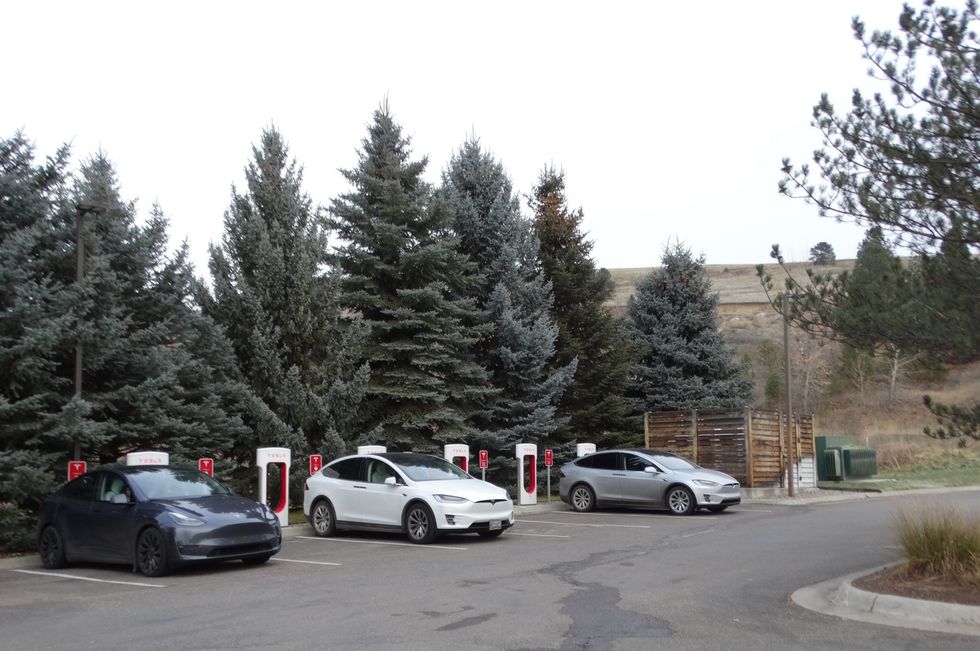
Travelers can filter hotel results on the Best Western website to display properties equipped with Tesla electric charging stations, alongside those with existing EV charging stations, before booking or visiting. Additionally, individual hotels employ local efforts to promote this amenity, such as providing illustrated printouts at check-in and displaying electric charging symbols in digital reservation confirmations.
“Some hotels do charge for the use of the EV charging stations while some provide it as a free amenity for guests,” said Morton of BWH. “It’s up to the discretion of the hotel. As for the additional benefits, guests can filter hotel results on BWH Hotels’ website to those that include Tesla electric charging stations (in addition to properties with existing EV charging stations) ahead of booking or traveling to the property. Additionally, Tesla identifies all their charging station locations on their map which helps to increase consumer awareness for the hotel.”
For IHG, this varies by hotel based on what makes the most sense for their operations. Utility costs, local incentives for EV energy usage, and overall guest demand means there’s not a one-size-fits-all approach. In terms of revenue share, this also varies by hotel as EVC ‘ownership’ models offer hotels both full revenue and revenue/profit share opportunities.
“One benefit of our relationship with EnviroSpark is their ability to offer a suite of operating models to meet unique needs of our hotels,” McGuiness of IHG added. “Through this partnership, hotels will have access to negotiated pricing across a variety of options designed by EnviroSpark to meet varying needs of operators.”
Government programs driving EV adoption
Various state, local governments, and power companies offer incentives like tax credits and cash rebates, covering up to 90 percent of costs in certain areas. The federal Inflation Reduction Act of 2022 includes an Alternative Fuel Refueling Property tax credit, reimbursing up to 30 percent of equipment and installation expenses for each EV charger, according to a White House guidebook.
For projects post-Jan. 1, 2023, the IRA provides a 6 percent credit (subject to depreciation) per EV charger with a max of $100,000, or 30 percent (subject to depreciation) with prevailing wage and apprenticeship compliance, also capped per charger. Projects pre-2023 qualify for a 30 percent credit (subject to depreciation) with a max of $30,000 per EV charger.
However, IRA credits necessitate each EV charger to be in specific census tracts, aligning with low-income communities or areas outside designated urban zones. The DOE provides guidance and tax maps for tract eligibility, promoting clean energy investments nationwide.
The NEVI Formula Program allocates $5 billion to states for expanding the national EV charging network, covering up to 80 percent of costs for hotels along Alternative Fuel Corridors. This includes installation, operation, and maintenance of publicly available DC Fast Chargers.
Since 2021, 47 states and D.C. have offered financial incentives:
- New York's Charge Ready NY 2.0 grants up to $4,000 per charging port.
- Massachusetts' MassEVIP funds up to 60 percent of charging port installation, capped at $50,000 per address.
- Virginia's EV Charging Station Deployment Grants offer up to $400,000 for rural or underserved areas.
- California's Golden State Priority Project offers 50 percent rebates for DC Fast Charger installations, with max rebates of $55,000 or $100,000 based on charger output.
- Illinois' EV Charging Station Grants cover up to 80 percent of installation and maintenance costs for Level 2 chargers and DC Fast Chargers.
These incentives complement state and local regulations mandating EV charging infrastructure in new developments, like California, New York, Massachusetts, and D.C.
The future is green
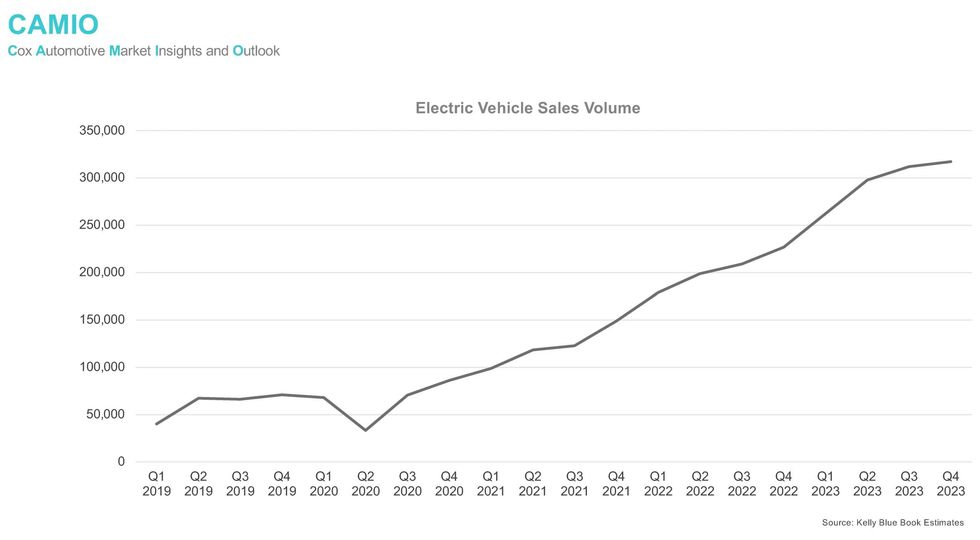
Despite slow initial adoption, EV sales in the US are steadily climbing. In the final quarter of 2023, sales surged by 40 percent year-over-year, totaling nearly 1.2 million vehicles, according to Cox Automotive. The overall EV market share in the US also grew from 5.9percent to 7.6 percent compared to a year earlier. Notably, Mercedes and Tesla reported strong performances, with Mercedes seeing a 248 percent increase in EV sales and Tesla's sales rising by 38 percent.
The greatest demand for EV charging infrastructure will arise during travel, primarily along highways for quick 'fill-ups' and at hotels for overnight charging. EV drivers will expect to charge their cars overnight while they sleep, mirroring the convenience of home charging.
"Electric vehicles are here to stay," said Booth. “Charging infrastructure is an investment in the near future and a commitment to meeting evolving guest needs. Hotels must embrace this amenity to stay relevant and keep a competitive advantage in retaining loyal customers and attracting a new segment of eco-conscious, tech-savvy travelers. This presents a unique opportunity for EV charging infrastructure. As EV numbers grow, hotels may see 10 or 15 EVs in their parking lots every night.”
"With plans to expand our EVC network globally in the coming years, IHG is committed to meeting the rising customer demand for electric vehicle charging while supporting a shift to a low-carbon economy," said McGuiness of IHG. "Additionally, IHG is assisting hotel owners with an EV charging playbook containing best practices and preferred vendors to streamline installation.
BWH may expand its program, Morton said.
"While our current program rolls out EV charging stations in the U.S., Canada, and Mexico, BWH Hotels is exploring options to offer EV charging amenities internationally, aligning with our sustainability focus," he said.
"Experts suggest that hotel EV charging may follow the path of Wi-Fi adoption seen in the early 2000s, eventually becoming nearly ubiquitous," said Nair of Bosch USA. "Considering sustainability, revenue growth, cost reduction, and customer retention, providing EV support infrastructure presents a compelling case for hotels as EVs become commonplace on U.S. roads in the next decade."

















